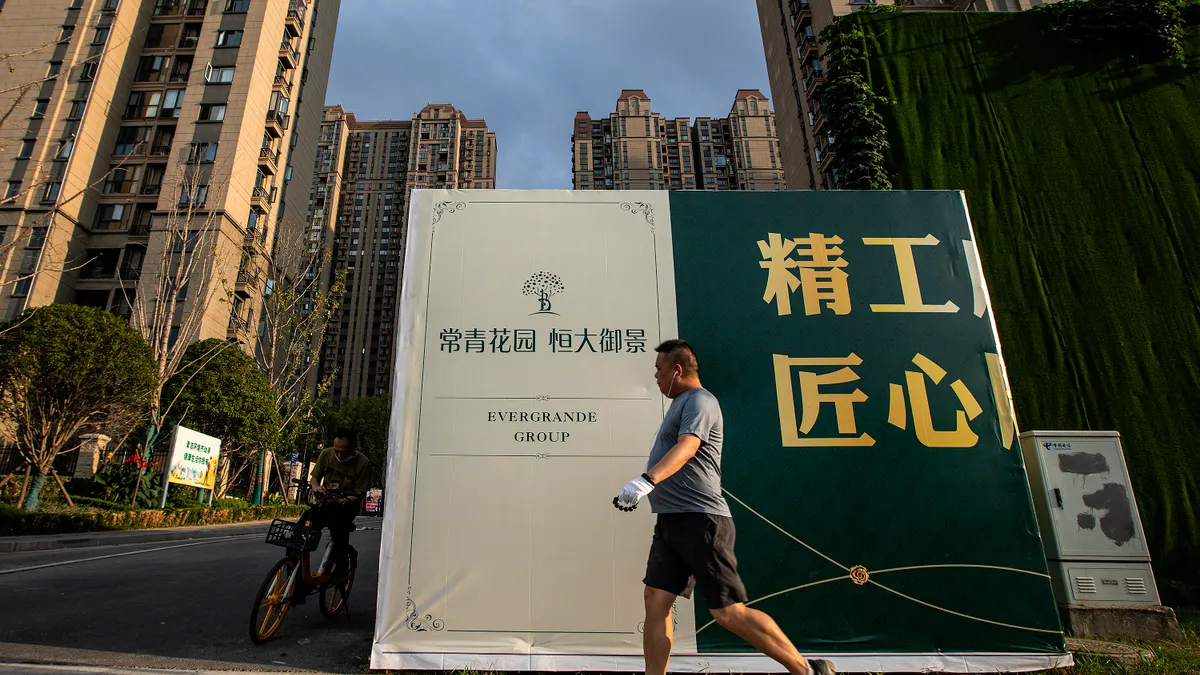UPDATE: November 29, 2021 Chinese developer Evergrande's unfinished $1.8 billion soccer stadium in Guangzhou has been taken over by the Chinese government, which hopes to sell it, according to Reuters. The embattled company has over $300 billion in debt, and is also considering selling the Guangzhou Football Club as the company struggles to get its head above water.
In the case that there are no buyers, the government will take over the project via the state-owned Guangzhou City Construction Investment Group, the source, who declined to be named, told Reuters.
The Guangzhou Football Stadium was meant to be one of the largest in the world and a jewel for the Chinese soccer scene. The project was slated for completion by the end of 2022, however, another source told Reuters that it hasn't been worked on for at least three months.
Dive Brief:
- Plans for a lotus-shaped soccer stadium for China's Guangzhou FC are in trouble as financier Evergrande’s looming financial insolvency and cratering stocks spell trouble for the venue and hundreds of other in-progress properties at large, according to Business Insider.
- Evergrande, the Shenzhen-based development firm and the second-largest property developer in China, is a massive conglomerate that has been at the forefront of construction in the country and is now in danger of defaulting on over $300 billion in debt. Some experts have said that Evergrande failing could be China's "Lehman Brothers moment."
- The $1.8 billion stadium, located in China's southern Guangdong province, is half-completed. If completed, the stadium would seat 100,000 people and have a floor area of 1.6 million square feet, according to Business Insider.
Dive Insight:
The stadium for Guangzhou FC was a crown jewel for Chinese soccer, and meant to be a symbol of the effort to build China into an international powerhouse for the sport, rising up alongside some European teams. When the stadium broke ground in 2020, Evergrande president Xia Haijun said it would become a landmark comparable to the Sydney Opera House and the Burj Khalifa.
But now, construction has come to a near standstill as little work appears to be done on the structure. Evergrande insisted that construction is continuing as planned, according to Reuters, despite its financial woes. However, the South China Morning Post reportedly only saw a few workers at the site on recent visits there.
"How could the biggest soccer stadium in the world not be built? It won't become a waste construction site. The government wouldn't let this happen," said one nearby store owner to Reuters.
Persistent financial worries
The problems with the stadium stem from the financial issues plaguing Evergrande.
The financial worries surrounding Evergrande have been widely reported on, and for good reason -- the financial shock of the conglomerate coming apart and defaulting on its loans would cause ripple effects through the Chinese economy and beyond, according to experts.
In 2012, Andrew Left, the founder of stock commentary site Citron Research, published a report targeting Evergrande, calling the company "insolvent" and saying that it would be "severely challenged from a liquidity perspective," according to CNBC. As a result of his report, Left received a ban from trading in Hong Kong, which expired last month.
Left said that the company used "fraudulent, aggressive accounting" and that it issued junk debt in an interview with Institutional Investor in August. Left also believes that the Chinese government will not bail out Evergrande or its chairman, billionaire Hui Ka Yan.
"I don't know what happened, but finally this past week, or month, he ran out of friends who are going to refinance his debt, and the debt became way too much," Left said of Hui to Institutional Investor. "In China, the big talk is, 'He's not too big to fail.'"














